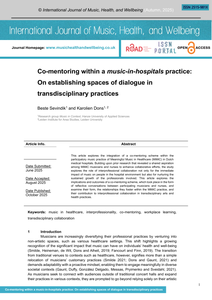This article explores the integration of a co-mentoring scheme within the participatory music practice of Meaningful Music in Healthcare (MiMiC) in Dutch medical hospitals. Building upon prior research that revealed a shared aspiration among MiMiC musicians and nurses to enhance collaborative efforts, the study explores the role of interprofessional collaboration not only for the immediate impact of music on people in the hospital environment but also for nurturing the sustained growth of the professionals involved. This article explores the implications and outcomes of a co-mentoring scheme, which took place in the form of reflective conversations between participating musicians and nurses, and examine their form, the relationships they foster within the MiMiC practice, and their contribution to interprofessional collaboration in transdisciplinary arts and health practices.
DOCUMENT

The present study evaluates the Youth Initiated Mentoring (YIM) approach in which families and youth care professionals collaborate with an informal mentor, who is someone adolescents (aged twelve to twenty-three) nominate from their own social network. The informal mentor can be a relative, neighbour or friend, who is a confidant and spokesman for the youth and a co-operation partner for parents and professionals. This approach fits with the international tendency in social work to make use of the strengths of families’ social networks and to stimulate client participation. The current study examined through case-file analysis of 200 adolescents (YIM group n ¼ 96, residential comparison group n ¼ 104) whether the YIM approach would be a promising alternative for out-of-home placement of youth with complex needs. A total of 83 per cent of the juveniles in the YIM group were able to nominate a mentor after an average of thirty-three days. Ninety per cent of the adolescents in the YIM group received ambulatory treatment as an alternative for indicated out-of-homeplacement, while their problems were largely comparable with those of juveniles in Dutch semi-secure residential care. Results suggest that the involvement of important non-parental adults may help to prevent out-of-home placement of adolescents with complex needs.
MULTIFILE

Research into workplace mentoring is principally focussed on predictors and psychosocial and instrumental outcomes, while there is scarcely any in-depth research into relational characteristics, outcomes and processes. This article aims to illustrate these relational aspects. It reports a co-constructed auto-ethnography of a dyadic mentoring relationship as experienced by mentor and protégé. The co-constructed narrative illustrates that attentiveness towards each other and a caring attitude, alongside learning-focussed values, promote a high-quality mentoring relationship. This relationship is characterised, among other things, by person centredness, care, trust and mutual influence, thereby offering a situation in which mutual learning and growth can occur. Learning develops through and in relation and is enhanced when both planned and unplanned learning takes place. In addition, the narrative makes clear that learning and growth of both those involved are intertwined and interdependent and that mutual learning and growth enrich and strengthen the relationship. It is concluded that the narrative illustrates a number of complex relational processes that are difficult to elucidate in quantitative studies and theoretical constructs. It offers deeper insight into the initiation and improvement of high-quality mentoring relationships and emphasises the importance of further research into relational processes in mentoring relationships.
LINK